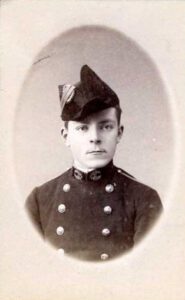According to the chronicles, the grandson was very much like his grandfather Ozanam.
Frederic Claude Marie Laporte was the grandson that Blessed Antoine Frederic Ozanam never knew. Frederic Laporte was born on May 16, 1868 in Paris (France), two years after the marriage of Ozanam’s daughter, Marie Josephine, to Jean-Baptiste Laurent Laporte.
 He studied at the Ecole Polytechnique, the Ecole Supérieure d’Electricité and the Ecole des Mines, all in Paris. He graduated as a civil mining engineer. He began his engineering career in a company called “Richard”, but soon decided to devote himself to scientific studies, joining the Central Electricity Laboratory (LCE), where he remained for many years.
He studied at the Ecole Polytechnique, the Ecole Supérieure d’Electricité and the Ecole des Mines, all in Paris. He graduated as a civil mining engineer. He began his engineering career in a company called “Richard”, but soon decided to devote himself to scientific studies, joining the Central Electricity Laboratory (LCE), where he remained for many years.
In this position, where he reached the rank of deputy director, Laporte focused on the study of illumination, photometry, electrical units and patterns, publishing his findings in the Bulletin of the French Electrical Society. Given the knowledge he possessed, he represented France at numerous congresses throughout Europe, as well as in the United States.
At the age of 28 – in 1896 – he married Marguerite Récamier (1877-1951), daughter of General Récamier. From then on, his life would be divided between his scientific occupations and the beautiful family of seven children given to him by this admirable companion, who devoted herself to her husband until the end of her life with untiring devotion. Their children were named Gabrielle, Sabine, Marie, François, Jean, Magali and Frederic.
In the midst of his studies and laboratory research, Frederic Laporte was surprised by the First World War (1914-1918). Called up by the Armed Forces, he was appointed Captain of Territorial Artillery and took command of the Fort of Béru, in the Reims region, 100 miles from Paris. He defended this fort for many months against the German forces, but had to evacuate the place, moving to Epernay, then to Dijon and Verdun.
The chronicles point out that Frederic Laporte was an excellent military man, a strategist and at the same time very concerned about the safety of the soldiers of the artillery platoon he commanded. During the war, he became ill with heart disease and had to be hospitalized. In 1915, he was discharged from military service and returned to his family. The doctors recommended rest, but inactivity made him uncomfortable.
So, although he was not sufficiently recovered, he was authorized to return to his activities. He went on to teach at the Artillery School of Fontainebleau, where he stayed for two years (1915 and 1916). Frederic Laporte then returned to work at the Central Laboratory and focused his studies on underwater electric accumulators.
For his services to France, he was decorated with the Cross of the Legion of Honor (1918), which was awarded as a military honor. After the war, he continued his duties as deputy director of the Laboratory, but his health was hopelessly compromised.
He resisted for a long time, until in March 1922 he had to return home and completely abandon his work. He endured this cruel ordeal with incomparable courage and serenity, which he drew from his deep Christian convictions and from his grandfather, whom he never met but knew of his reputation for holiness. Feeling defeated, he wanted to give to the end a beautiful example of fortitude to his children; one cannot avoid making a comparison between the beautiful end of this man, still young, in full possession of all his intellectual resources, and that of his grandfather Ozanam, who at the age of 40, struck down by a merciless illness, made with admirable serenity the sacrifice of a life so full of promise for him.
The biographies of Frederic Laporte tell that, although he never knew his grandfather Ozanam, with whom he bore a great physical resemblance, from his youth he imitated his charitable example, visiting the poor assisted by the Conference of St. Bernard in Paris, as an active member of the Society of St. Vincent de Paul.
Bibliographic records show that Frederic Laporte was a reserved but extremely welcoming person. Those who were fortunate enough to know him intimately soon realized his high moral worth, the liveliness of his intelligence and the breadth of his knowledge. He considered himself very happy when he was with his family, and devoted to the education of his children all the free time that his scientific occupations left him.
On July 17, 1922, Frederic Laporte died, at the age of 54, in the arms of his wife, who had taken such admirable care of him. He had seen the death of his mother, Marie Josephine Ozanam, in 1912, when he was 44 years old. A curious fact: the same year that Frederic died (1922), his father (Laurence Laporte) also died, at the age of 79.
Renato Lima de Oliveira
International President of the Society of St. Vincent de Paul





0 Comments